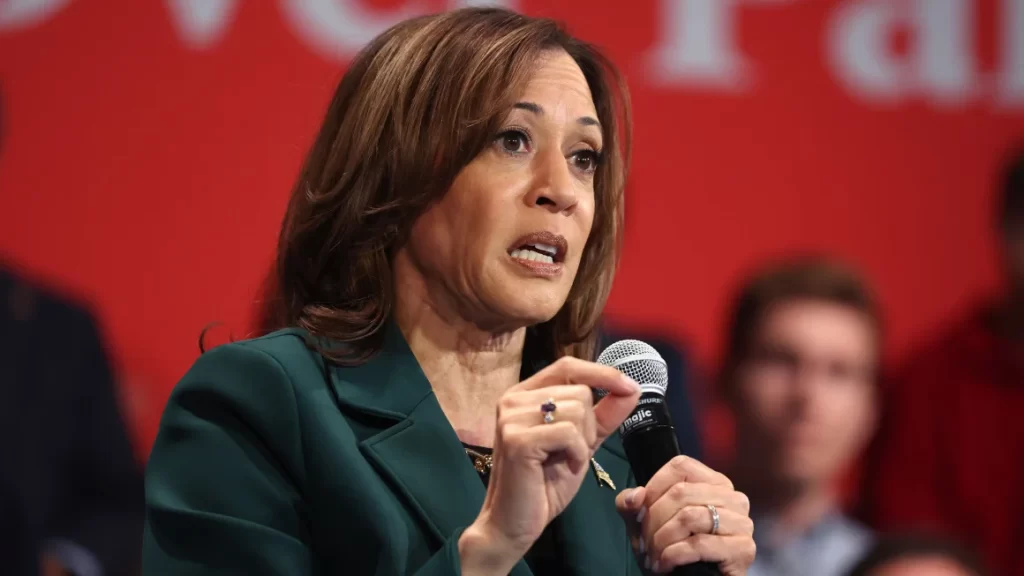Harris Campaign Gears Up for a Narrow Victory Push
4 min read
Vice President Kamala Harris speaks at a campaign event in Brookfield, Wisconsin, on October 21, 2024. Scott Olson/Getty Images

Vice President Kamala Harris speaks at a campaign event in Brookfield, Wisconsin, on October 21, 2024. Scott Olson/Getty Images
As Election Day approaches in two weeks, Kamala Harris’ campaign is grappling with disheartening polling data indicating that a significant majority of Americans feel the country is headed in the wrong direction. Despite these challenges, Harris’ team remains optimistic, banking on the potential missteps of Donald Trump to sway voter sentiment in their favor.
Campaign strategists are counting on Trump to amplify his controversial rhetoric, such as labeling January 6 a “day of love” and making bizarre remarks, like his recent comments about golf legend Arnold Palmer during a rally in Pennsylvania. By diverting public attention to Trump’s erratic behavior, the Harris team hopes to frame his potential re-election as a step backwards for the nation.
Harris’ campaign chair, Jen O’Malley Dillon, emphasized the importance of making voters in battleground states aware of their choices. “In the key states where the presidency will be decided, the race is essentially tied,” she told donors during a recent retreat in Philadelphia.
David Plouffe, a veteran strategist and former campaign manager for Barack Obama, acknowledged the unusual competitive landscape. “Seven states could realistically come down to a point or less,” he noted. However, he expressed confidence that the Harris campaign’s ground game, built over the past year with a dedicated team, will prove more effective than Trump’s less-organized efforts.
Despite the advantages, Plouffe cautioned that Trump could still secure up to 48% of the vote in key states. The goal for Harris, therefore, is to achieve at least 50% support, or slightly lower, depending on the state.
To reach this target, the campaign is crafting high-profile events designed to maximize visibility for Harris. Illinois Governor JB Pritzker, a campaign co-chair, stated, “We need to ensure our presence is felt across these critical areas.”
Harris’ team is focusing on engaging disengaged voters through innovative campaign tactics. These include leveraging surrogates—celebrities and community members—to reach audiences on social media and through direct messaging campaigns. For example, during a recent event in Michigan, attendees were encouraged to host “Kamala Shabbat” dinners to foster community engagement.
While some Democratic operatives express concern about losing ground in traditional advertising, Harris’ aides argue that many target voters are not consuming political ads through conventional means. Instead, the campaign believes its detailed organizing efforts, tailored to precinct-level data, will allow them to connect with voters effectively.
Throughout the campaign, Harris’ team has been preparing for a close race that will hinge on pivotal moments. They are poised to unveil new endorsements from prominent figures and strategic appearances that resonate with voters who might feel alienated by Trump’s rhetoric.
A significant focus will be on reiterating messages regarding Trump’s unfitness for office while emphasizing Harris’ personal story and economic vision. The campaign aims to appeal to non-college-educated White women and bolster support among key demographics, including Black men and Latinos.
In the closing weeks, the campaign plans to unite Harris with her running mate, Minnesota Governor Tim Walz, who will target rural areas and male voters. His messaging will emphasize the risks of another Trump presidency and the lessons learned from past crises.
“We survived one Trump term, but we must not forget the consequences of his leadership during COVID-19,” Walz said at a recent rally, hinting at a broader narrative that Harris will promote in the coming days.
Advisers are also attentive to the concerns of nervous Democratic insiders. Many top donors, after a recent campaign briefing, left feeling reassured about Harris’ chances. Democratic National Committee Chairman Jaime Harrison painted a hopeful picture of a potential inauguration day featuring Harris, urging supporters to take collective action.
The campaign is aware of various grassroots efforts, including signs appearing in women’s restrooms that encourage private voting. This aligns with sentiments expressed by figures like former Republican Rep. Liz Cheney, who emphasized the importance of voting one’s conscience.
Despite speculation that a silent majority may be leaning towards Trump, Harris’ team is not relying on these assumptions. They are instead focused on actively reaching out to voters, particularly those who may feel disenchanted with the current political climate.
Local Democratic leaders are optimistic, citing a shift in sentiment among independents and some Republicans. “There’s a significant opening for us to connect with voters who are disillusioned with Trump,” said Nancy Quarles, chair of the Oakland County Democratic Party in Michigan.
As the campaign intensifies, Harris’ advisers remain cautiously optimistic about their chances, emphasizing that success will require sustained efforts to persuade undecided voters in the final days leading up to the election.